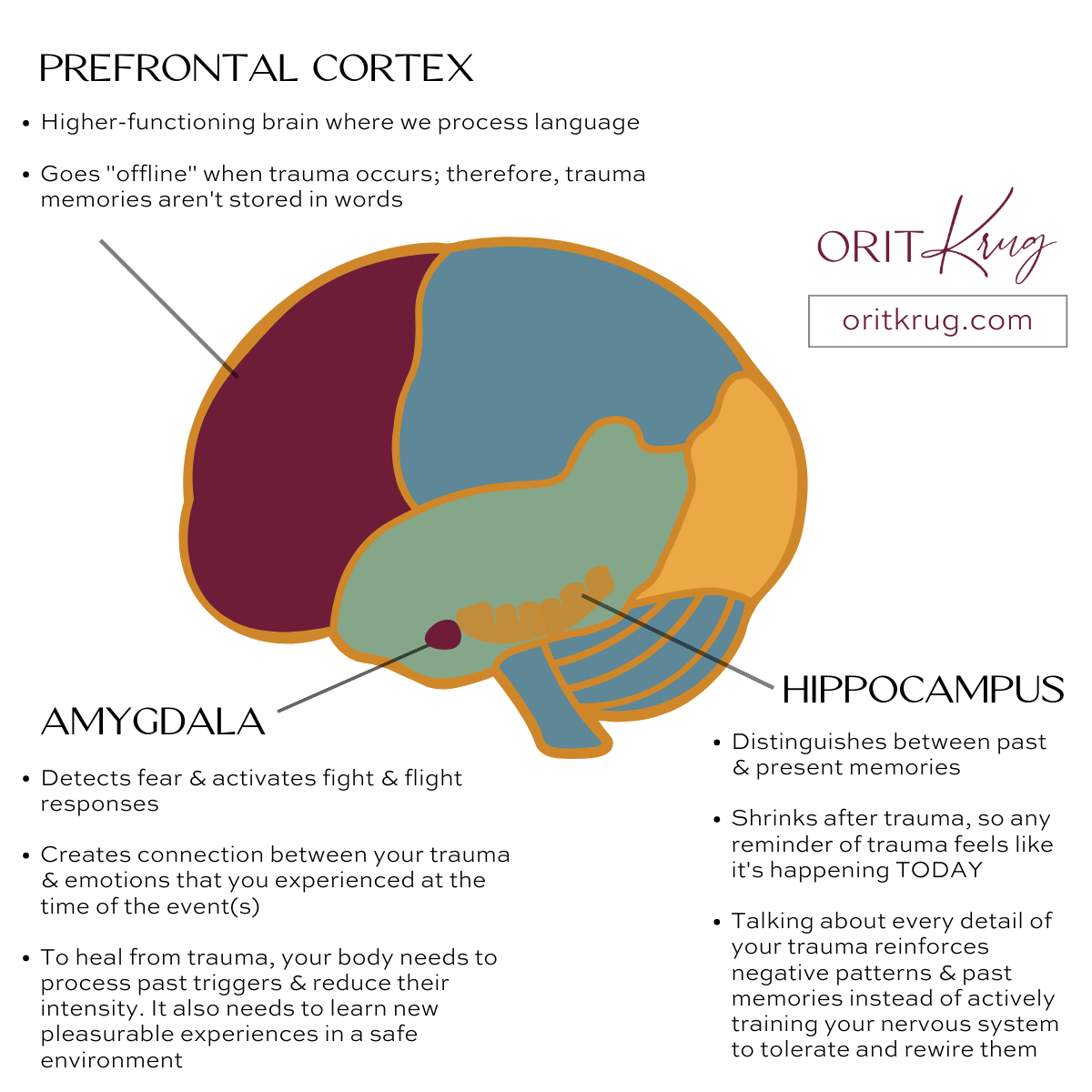How to feel compersion in polyamory even with a history of abandonment and trauma
By Orit Krug | July 3rd, 2023
Compersion in polyamory/ENM can feel extremely difficult when you have a history of trauma around abandonment & rejection.
I’m writing this post just a few days after my husband’s girlfriend came to visit for the first time. Since it was such a new experience for all of us, I had no idea what to expect. As someone who experienced trauma and anxious attachment for most of my life, I saw this as an opportunity to utilize my regulation skills, healing, and security I’ve gained over the years. Naturally, I was also nervous how it might trigger me, too.
Ideally, I wanted to feel compersion and all the positive things for both my husband and his girlfriend. In reality, I felt a spectrum of emotions including, but not limited to compersion, joy, love, insecurity, jealousy, and grief.
Whether you have an abandonment wound or not, it’s not realistic to expect constant compersion from yourself or your partners. Even the “healthiest” individuals and couples struggle with jealousy from time to time. This is a normal part of the human experience.
What does compersion feel like in the body?
You probably already know that compersion is the “opposite of jealousy.” It’s the experience of feeling pleasure and joy for our partners’ pleasure, especially in the context of them dating and/or sleeping with other people.
There are so many articles that explain the definition of compersion and tips on how to experience it. However, most of these blogs teach us about compersion with an intellectual approach, when it is actually an embodied experience.
It’s important to ask yourself: what does compersion feel like for me?
An example of a cognitive or mindset-based answer may be, “It’s when I feel excited or happy for my partner when they’re experiencing NRE with someone new.”
However, I encourage you to dig deeper and ask, “What does compersion feel like in my body?”
Close your eyes for a moment and imagine yourself feeling happy and excited for your partner’s NRE with someone new. Even if you’ve never experienced this in real life, just pretend for a moment that you are deeply happy for your partner in this context..
What sensations come up in your body? Do you feel an overall lightness in your body? A flutter in your heart? An energy running through your arms and legs that makes you want to jump and hug them?
There’s no right or wrong way to feel these sensations in your body. It’s also okay if you can’t even imagine or pretend feeling compersion yet. You can drop the whole image of feeling compersion, and simply tune into how your body feels when you’re excited for your partner when they get a good review at work or experience love with a platonic friend.
Need more guidance with this? Try this guided movement meditation on compersion.
Whatever sensations come up as you feel compersion in your body – these can inform you how you may be able to feel them in your real-life relationships. The sensations could feel similar to excitement, love, joy, pleasure, calmness, softness, or even a neutral happiness.
For example, if you felt a calm stillness in your body while sensing compersion in your body, that may be an accurate reflection of how you’ll feel the next time your partner goes on a date. It may be very subtle. You might even expect to feel like you’re “supposed to be” overly excited. But rest assured – compersion comes in multiple forms.
One of the struggles that many people have around experiencing compersion is that they hold themselves to specific expectations on how they’re “supposed to” feel it. Drop those expectations. Eliminate any preconceived notions that you can only experience compersion if you’re absolutely over the moon for your partner. We all feel emotions in different ways and on different days.
How to feel compersion even when you’re triggered by jealousy.
There’s an issue in the way we define compersion. By saying, “it’s the opposite of jealousy” can be misleading. Many people take this to mean that we can’t possibly experience compersion if we’re also feeling jealous. This is an unhealthy perspective.
Why?
Because we are fully, wholly human. We have a full range of emotions happening constantly and simultaneously. The messages we get from society and our minds say that we cannot have opposing emotions at the same time. Therefore, if I feel sad, I must not be feeling happy. If I feel disgust toward another, I must not be feeling compassion. If I feel jealous, I must not be feeling compersion.
Most of the time, for the majority of people, we experience a multitude of emotions at the same time. However, we tend to focus on the “bad” ones, which overshadows the “good” ones.
I found myself doing this right before my husband’s girlfriend’s visit. I was feeling very jealous and excited at the same time, but I was fixated on the jealousy. I felt bad about myself and my inability to simply be happy for my partner. But the truth is, I did feel excited and happy for him. I also felt jealous.
It wasn’t until I accepted my imperfect humanness, that I could embrace and feel love for myself in the face of the whole range of emotions. Which, by the way, are extremely normal in a situation like this.
We are generally too hard on ourselves and have been taught a black-or-white, or all-or-nothing perspective about emotions. The real human experience of emotions, especially in relationships, primarily exists in a gray area, filled with lots of different emotions.
If you feel jealous and insecure in any of your relationships, please acknowledge them and take the opportunity to work through them. At the same time, ALSO notice if there’s even an ounce of compersion present too. Remember, you can feel a fleeting sense of calmness, joy, love, excitement, etc, for your partner as a way of feeling compersion. Notice this and give yourself some damn credit: you’re feeling compersion, even in the presence of jealousy
When trauma gets in the way of compersion.
If you have unresolved trauma around abandonment or rejection, it may be extremely difficult for you to feel even a tiny bit of compersion. When trauma is stored in the body, it only takes a subtle trigger to put our nervous systems into a state of intense fear and protect us from potential pain.
Even if you’ve read many articles about compersion, or you’ve talked in therapy about how to feel secure while your partner dates others… your nervous system and body will typically react impulsively before your mind can even interrupt and say it’s okay.
This is not your fault. It’s not a reflection of your “inability” to heal past trauma or have healthy open relationships. Trauma around attachment and abandonment hardwires our brain and bodies to become overprotective of our hearts. Brain mapping research shows how the brain’s “fear center,” or the Amygdala, is overactive in trauma survivors. Research also shows that the Prefrontal Cortex (PC) goes “offline” when we are triggered by past trauma; yet most of us try to heal by “talking to” the PC through verbal processing in traditional therapy, repeating affirmations, journaling, and more.

My client Katie spent over 10 years in traditional talk therapy trying to heal her abandonment trauma. She became an “expert” in her own trauma history. She knew exactly why she was so afraid of losing her partners. She made lists of ways she could stop feeling jealous through her ENM experiences. However, when her partner dated or slept with others, she often felt a full-body heat and rage take over her body. In those moments, she desperately repeated, “I am safe, I am enough,” but her sensations were so intense, she still spiraled into jealous episodes.
Katie had tried to tell her Prefrontal Cortex that everything was okay, but the PC goes offline during major stress and triggers. Plus, trauma is primarily stored in the Amygdala and body; thus, her attempts were futile. She didn’t understand what was “wrong” with her or why she couldn’t talk herself out of her jealousy. But that was the issue in itself – jealousy is an embodied experience exacerbated by unhealthy thoughts. The body must shift out of jealousy, not just the mind.
Through our work together, Katie was able to become comfortable with the sensations in her body associated with jealousy. Instead of impulsively reacting to them with a Fight (sending angry texts to partners) or Flight response (escaping the relationship), she was able to stay regulated. She became in command of these sensations in her body, sensing how they arose and moved through her body. She became in charge of how she responded to her partners despite the discomfort of jealousy in her body.
Because Katie was able to feel safe in her body through uncomfortable sensations, she had fewer experiences of jealousy / rage in her relationships. Even when she felt jealous, she was able to stay calm and gracefully voice her insecurities. She had a new ability to assert her needs without being aggressive or controlling. This created a new sense of freedom within Katie’s body and relationships. She was no longer hijacked by the fear that everyone would abandon her. Instead, she trusted she is worthy enough to be loved, without forcing or pressuring her partners to follow rigid rules.
After 10+ years of therapy, Katie finally embodied the sense of security, freedom, and love in herself, which spread to her relationships too. This was everything that she (and her therapist) tried to talk herself into feeling for so long!
Katie did not have a special ability to make the shift from cognitive understanding to embodied action. She just needed the right process to integrate her trauma healing with her entire body, so she could finally physically follow through on her mind’s intentions.
Join our somatic retreat for polyamorous folks navigating trauma
The latest trauma research consistently shows that trauma gets stored in the non-verbal parts of our brain and body. If you’ve been in therapy or seeking support for a while, but you still feel that trauma is hijacking your nervous system & body’s responses, this is NOT your fault. A somatic, embodied approach is necessary to process & release trauma. Talking can only get us so far.
I am co-facilitating a Poly Retreat with Dedeker Winston (co-host of Multiamory Podcast), where we will be using somatic therapy practices to help you integrate and embody the ability to deeply love yourself and your partners through your poly journey. Our neuroscience-backed practices are effective in processing traumas, working through current non-monogamy challenges, and deeply celebrating your incredible & courageous journey of practicing open love!
Click here to learn more about our next Poly Somatic Healing Retreat!
